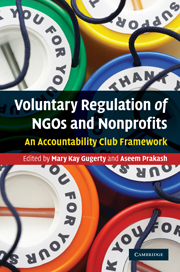Book contents
- Frontmatter
- Contents
- List of figures
- List of tables
- Notes on contributors
- Preface
- The club framework
- Part I Club emergence
- Part II Club sponsorship and club design
- Part III Club design and effectiveness
- 9 The impact of sponsorship on club standards and design
- 10 The emergence and design of NGO clubs in Africa
- 11 The benefits of accreditation clubs for fundraising nonprofits
- Future research and conclusions
- Index
- References
10 - The emergence and design of NGO clubs in Africa
from Part III - Club design and effectiveness
Published online by Cambridge University Press: 10 November 2010
- Frontmatter
- Contents
- List of figures
- List of tables
- Notes on contributors
- Preface
- The club framework
- Part I Club emergence
- Part II Club sponsorship and club design
- Part III Club design and effectiveness
- 9 The impact of sponsorship on club standards and design
- 10 The emergence and design of NGO clubs in Africa
- 11 The benefits of accreditation clubs for fundraising nonprofits
- Future research and conclusions
- Index
- References
Summary
Challenges to nonprofit and nongovernmental organization (NGO) accountability are particularly acute in sub-Saharan Africa (hereafter Africa), a region often characterized by illiberal democratic governance, weak mechanisms of regulatory oversight, and nascent civil societies. The combination of political liberalization and increased donor funding of nonprofits throughout the 1990s sparked a dramatic increase in the number of NGOs operating in most countries in Africa. In Kenya the estimated number of NGOs registered with the government grew from fewer than 500 in 1990 (Ndegwa, 1996) to nearly 3,200 in 2004 (National Council of NGOs, 2003). As a result of this growth, governments in Africa found themselves increasingly dependent on NGOs for the provision of key public services, but with few regulatory or coordination mechanisms at their disposal to influence or oversee the activities of these organizations (Barr et al., 2005). Donors also found it increasingly difficult to assess the capabilities and potential of the many newly emerging organizations. The need for standard-setting and oversight was underscored throughout this period by the periodic eruption of high-profile nonprofit scandals that began to challenge the reputation and credibility of legitimate organizations (Kwesiga and Namisi, 2006; Gibbelman and Gelman, 2004; Naidoo, 2004). These scandals emphasized to donors, governments, and NGOs themselves the need for stronger standard-setting and credentialing mechanisms for the sector.
Efforts to develop voluntary NGO accountability programs in Africa have flourished, a somewhat surprising development in a region not often noted for the strength of its institutions.
- Type
- Chapter
- Information
- Voluntary Regulation of NGOs and NonprofitsAn Accountability Club Framework, pp. 228 - 252Publisher: Cambridge University PressPrint publication year: 2010



